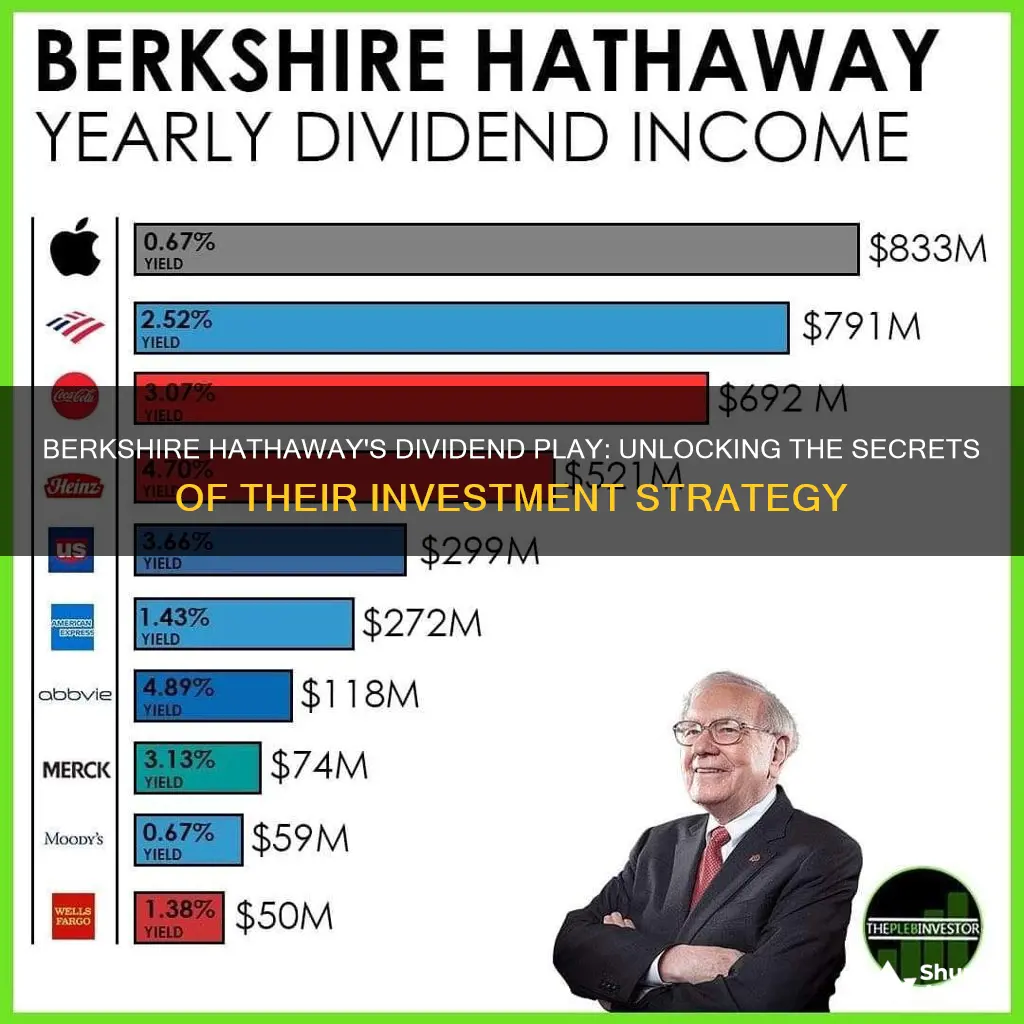
Despite being a large, mature, and stable company, Berkshire Hathaway, led by renowned investor Warren Buffett, does not pay dividends to its investors. Instead, the company chooses to reinvest retained earnings into new projects, investments, and acquisitions.
Buffett believes that prudent reinvesting adds better shareholder value and that investing back into the business provides more long-term value to shareholders than paying them directly.
While Berkshire Hathaway itself does not pay a dividend, more than half of the stocks in the holding company's roughly $310-billion equity portfolio do. In 2022, Berkshire Hathaway received $6.04 billion in dividend income, up from $5.06 billion in 2021 and $4.89 billion in 2020.
| Characteristics | Values |
|---|---|
| Reason for not paying dividends | Berkshire Hathaway does not pay dividends because it prefers to reinvest all of its earnings for growth |
| First and only dividend | Berkshire Hathaway paid its first and only dividend in 1967, two years after Buffett took over the company, for $0.10 per share |
| Current cash reserves | $189 billion |
| 2022 dividend income | $6.04 billion |
| 2021 dividend income | $5.06 billion |
| 2020 dividend income | $4.89 billion |
What You'll Learn

Berkshire Hathaway's dividend policy
Berkshire Hathaway does not pay dividends to its investors. Instead, the company prioritises reinvesting retained earnings into new projects, investments, and acquisitions. This strategy is driven by the belief of founder and CEO, Warren Buffett, that money can be better spent in these ways to create more long-term value for shareholders.
Buffett's reasoning is that reinvesting profits in the companies he controls will improve their efficiency, expand their reach, and create and improve products and services. This, in turn, will reward shareholders with higher stock values.
Buffett has three priorities for using cash that are ahead of any dividend:
- Reinvesting in the businesses
- Making new acquisitions
- Buying back stock when it is selling at a meaningful discount
Buffett's stance is supported by statistics. Berkshire Hathaway's BRK-A shares increased by 3,787,464% from 1965 to 2022, compared to the S&P 500, which returned 24,708% over the same period.
Despite Buffett's long-held stance, there is speculation that his successor, Greg Abel, may have different thoughts about paying dividends. However, it is unclear when this transition will occur.
Although Berkshire Hathaway does not pay dividends, over half of its holdings include dividend-paying stocks. In 2022, the company received $6.04 billion in dividend income, with 71% coming from just five stocks. These include:
- Coca-Cola, with a 3.1% dividend yield
- Bank of America, with a 2.5% dividend yield
- Chevron, with a 3.9% dividend yield
- American Express, with a 1.2% dividend yield
Invest Now: Where to Put Your Money
You may want to see also

The company's reinvestment strategy
Berkshire Hathaway's philosophy is to reinvest retained earnings into new projects, investments, and acquisitions, rather than paying dividends to its investors. This strategy is driven by Warren Buffett's belief that money can be better spent in other ways to create more long-term value for shareholders.
Buffett's priority is to reinvest profits in the companies he controls, with the aim of improving their efficiency, expanding their reach, and enhancing their products and services. He considers this approach to be more beneficial for shareholders than paying dividends, as the company's financial success translates into higher stock values.
Buffett's three main priorities for cash allocation are reinvesting in businesses, making acquisitions, and buying back stock when it is selling at a discount. He views dividend payments as a lower priority and has joked about the only time Berkshire Hathaway paid a dividend in 1967, calling it a "terrible mistake".
Buffett's investment philosophy is influenced by the Benjamin Graham school of value investing, which involves seeking out undervalued securities based on their intrinsic worth. He considers factors such as company performance, debt, and profit margins, and prefers companies with small amounts of debt and strong profit margins.
Buffett's investment strategy can be summarised into five macro-groups:
- Operating businesses that Berkshire Hathaway owns entirely or at least 80%.
- Publicly traded equities portfolio with a stake of 5% to 10%.
- Significant ownership of approximately 25% to 50% in four companies.
- Cash and cash equivalents as a buffer against mistakes and difficult circumstances.
- Insurance companies as a source of cheap cash to fund other assets.
Apple Investors: Who's Involved?
You may want to see also

Share repurchases
Warren Buffett has said that he would prefer to repurchase shares than pay dividends, as he believes that "dividends have the implied promise that you keep paying them forever and not decrease them". In his view, repurchasing shares is often more beneficial for shareholders. Berkshire Hathaway's share repurchases have been speeding up, with the company spending approximately $2.2 billion to $2.4 billion on repurchases in 2024 as of March 6. This is an increase from the $2.2 billion spent in the fourth quarter of 2023 and $9.2 billion in total for the year. The peak year for buybacks was 2021, when they totalled $27 billion.
Buffett's preference for share repurchases is part of his broader priority of reinvesting profits back into the companies he controls. He believes that this is a better way to create shareholder value than paying dividends. By reinvesting profits, Buffett aims to improve the efficiency of the companies, expand their reach, and create and improve their products and services. This strategy has been successful, with Berkshire Hathaway's BRK-A shares increasing by 3,787,464% from 1965 to 2022, compared to the S&P 500's return of 24,708% over the same period.
In addition to reinvesting profits, Berkshire Hathaway also uses its cash for acquisitions. In 2022, the company announced its first takeover since 2015, acquiring insurance company Alleghany Corp. for $11.6 billion. This move further demonstrates Buffett's commitment to investing in businesses and expanding their reach rather than paying dividends.
Despite Berkshire Hathaway's focus on reinvesting profits and acquiring new businesses, the company has faced some pressure from shareholders to pay dividends. However, Buffett's track record of creating shareholder value through other means has largely silenced critics. In one of his letters to shareholders, Buffett suggested that the company might consider paying dividends in 10 or 20 years, but as of 2024, there are no indications that this will happen anytime soon.
The Debt-Investment Dilemma: Navigating the Path to Financial Freedom
You may want to see also

Berkshire Hathaway's acquisitions
Berkshire Hathaway has made 63 acquisitions across sectors such as insurance carriers, energy storage, and Fortune 500 companies. The company has spent over $167 billion on acquisitions.
Warren Buffett's first acquisition was in 1962 when he began acquiring shares of a struggling New England textile company called Berkshire Hathaway. In 1967, he acquired the National Indemnity Company, a struggling insurer tied to the foundering auto market, for $8.6 million.
In the years that followed, Berkshire Hathaway made several notable acquisitions, including:
- Benjamin Moore, Johns Manville, and Shaw Industries in 2000
- Fruit of the Loom and The Pampered Chef in 2002
- Clayton Homes and McLane Company in 2003
- Goldman Sachs and General Electric in 2008
- Burlington Northern Santa Fe in 2009
- Lubrizol in 2010
- Heinz in 2013
- American, Delta, Southwest, and United Continental in 2016
More recently, in 2022, Berkshire Hathaway acquired Markel Corporation and Alleghany. In 2023, the company acquired a full ownership stake in Pilot Flying J.
Berkshire Hathaway has a set of criteria for its acquisitions, including a preference for large purchases of at least $50 million in before-tax earnings, consistent earning power, good returns on equity, and simple businesses. The company also prefers to buy for cash and will not engage in unfriendly takeovers.
Cramer's Investing Club: Strategies and Secrets
You may want to see also

The company's cash pile
Berkshire Hathaway's cash pile has been steadily growing over the years, with the company opting to reinvest retained earnings into new projects, investments, and acquisitions rather than paying dividends to its investors. In its 2022 annual report, the company reported a net loss of $22.8 billion and a cash pile of $125 billion. By May 2024, this had grown to a record $189 billion.
The company's preference for reinvesting profits is driven by founder and CEO Warren Buffett's belief that money can be better spent in other ways, focusing on improving efficiency, expanding reach, and creating new products and services. This strategy has proven successful, with Berkshire Hathaway's BRK-A shares increasing by 3,787,464% from 1965 to 2022, far outperforming the S&P 500, which returned 24,708% over the same period.
Despite the growing cash pile, Buffett has expressed frustration at the "sky-high" prices for acquisitions, making it challenging to find suitable investment opportunities. In his annual letter to investors in 2019, Buffett wrote, "Prices are sky-high for businesses possessing decent long-term prospects," indicating his desire for an "elephant-sized acquisition."
While Berkshire Hathaway itself does not pay dividends, over half of its holdings pay dividends, and many of them have yields of 4% or higher. The company has also engaged in stock buyback programs, particularly when few external acquisition opportunities are available. In 2021, Berkshire spent a record $27 billion on buybacks, and in the first quarter of 2024, it repurchased $2.6 billion of its own stock.
With Berkshire Hathaway's vast cash reserves and Buffett's commitment to reinvestment, the company continues to seek out profitable acquisitions and investment opportunities to further grow its portfolio and create value for its shareholders.
Amazon: A Worthy Investment
You may want to see also
Frequently asked questions
Warren Buffett believes that money can be better spent by reinvesting retained earnings into new projects, investments, and acquisitions.
Berkshire Hathaway chooses to reinvest profits into new projects, investments, share buybacks, and acquisitions.
Yes. Berkshire Hathaway's BRK-A shares have increased by 3,787,464% from 1965 to 2022, compared to the S&P 500, which returned 24,708% over the same period.
As long as Buffett is in charge, it's unlikely the company will pay dividends. However, Greg Abel, Buffett's successor, might have different plans.
Some of the dividend-paying stocks in Berkshire Hathaway's portfolio include Bank of America, Coca-Cola, Chevron, and Kraft Heinz.







